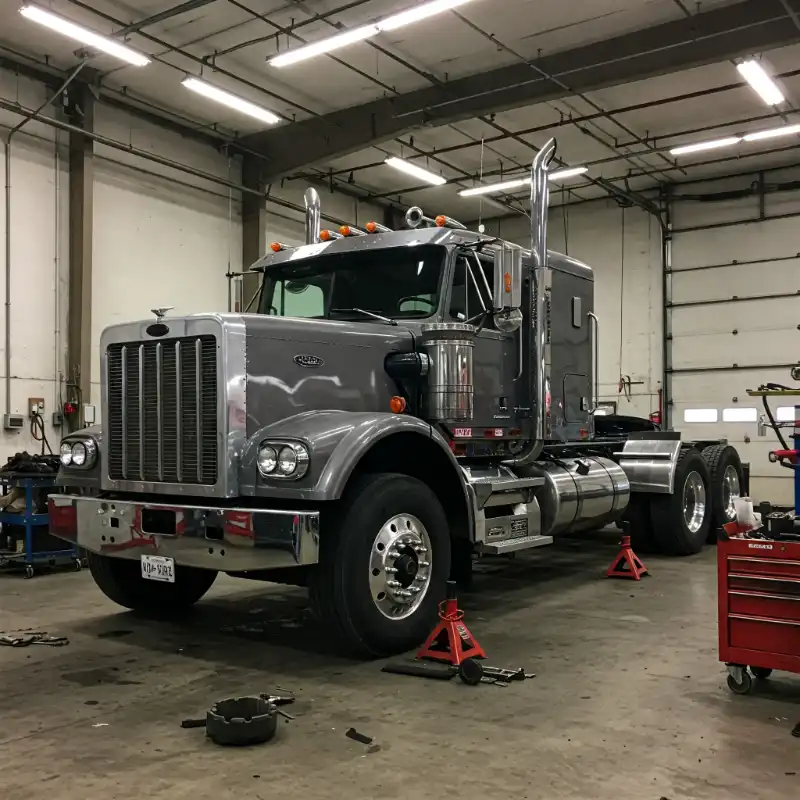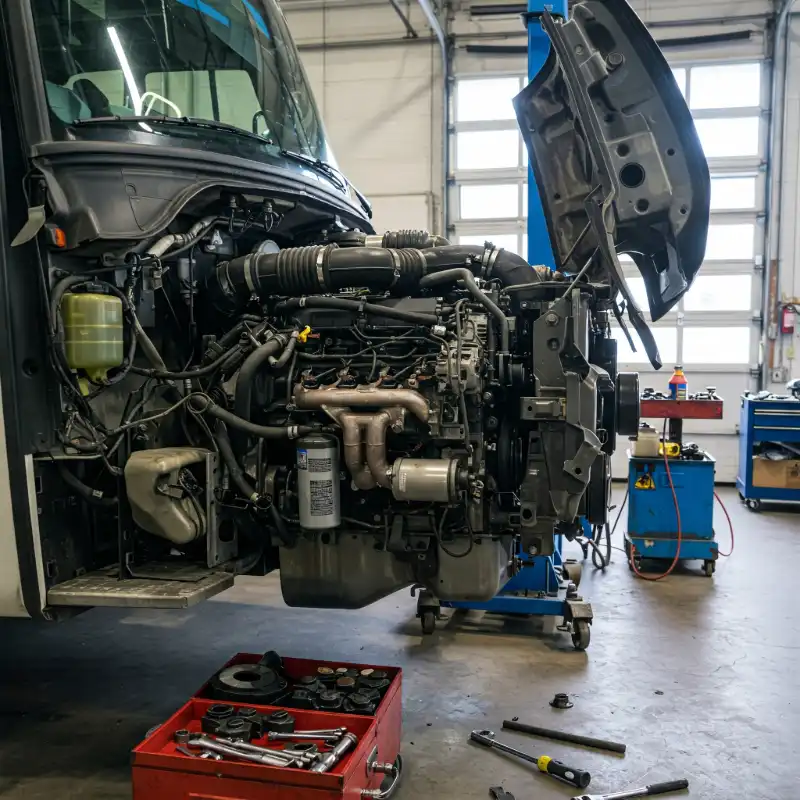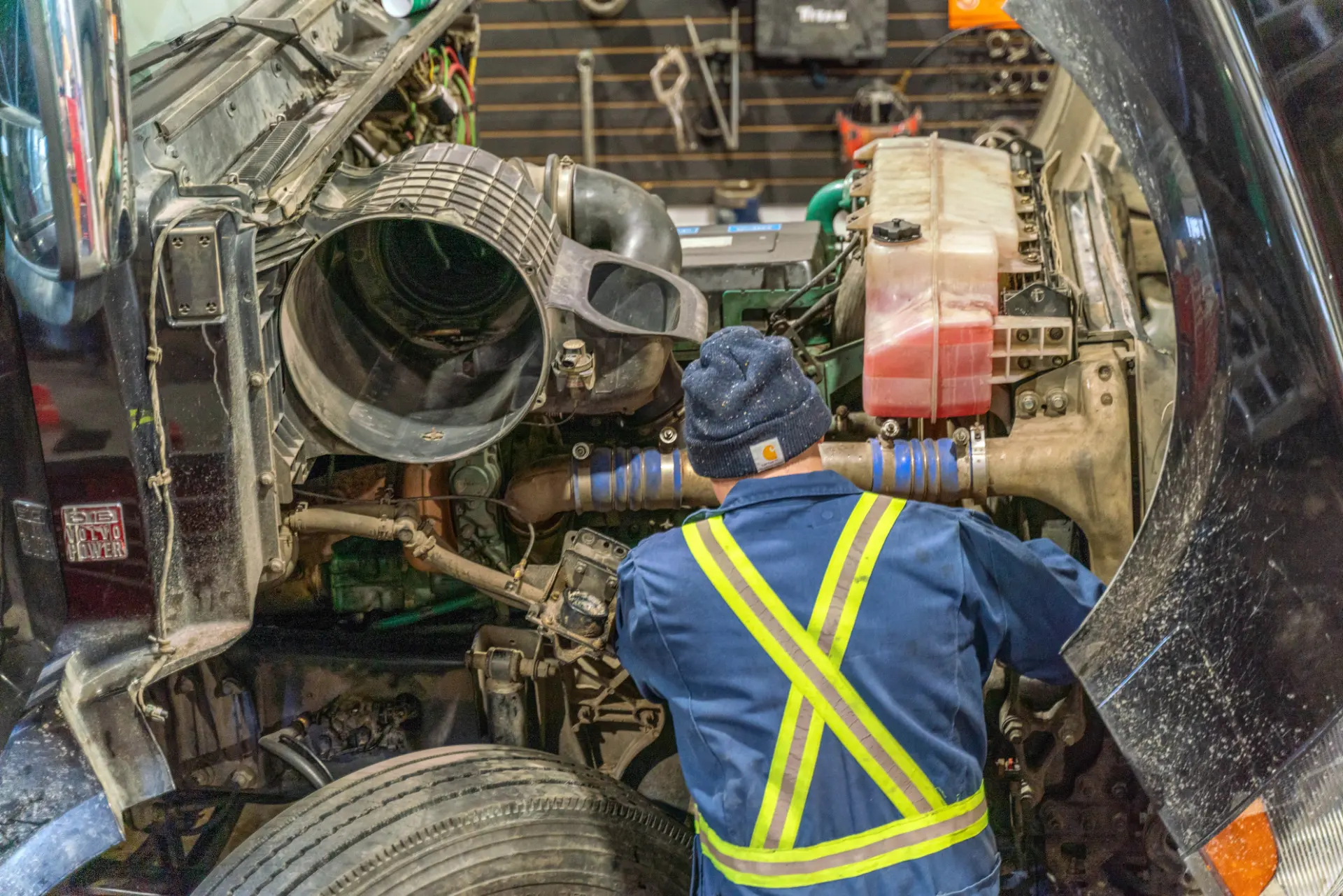Comprehensive Maintenance Checklists for Diesel Truck Owners
Regular maintenance for your diesel truck prevents costly breakdowns, enhances safety, and improves fuel efficiency.

Your diesel truck hauls cargo to keep your business running and allows you to conquer the open road. But just like any hardworking machine, diesel trucks require regular preventative maintenance to perform at their peak and avoid costly breakdowns. Studies by Fleetowner show that a staggering 40% of all heavy-duty truck breakdowns are preventable through routine maintenance. Neglecting these crucial checks can lead to unexpected repairs, lost time, and potential safety hazards. This article from Fleetgo Heavy Duty, your trusted partner for diesel truck repair and maintenance, will provide you with comprehensive checklists to ensure your truck stays in top condition. By following these simple steps, you can extend the lifespan of your vehicle, improve fuel efficiency, and keep yourself safe on the road.
The Importance of Preventative Maintenance
Preventative maintenance is an investment in the longevity and performance of your diesel truck. It's a proactive approach to caring for your vehicle, identifying and addressing potential problems before they become major issues. Here's a breakdown of essential checks to include in your routine:
Pre-Trip Inspection (Every Day):
Tires and Wheels: Perform a visual inspection of your tires for proper inflation, signs of wear or damage, and any foreign objects lodged in the tread. Uneven wear patterns or bulges in the sidewall can indicate alignment issues or internal damage, requiring professional attention. Ensure lug nuts are properly tightened to avoid wheel detachment while driving. Get increased fuel economy with effective diesel truck tires.
Lights and Signals: Turn on all lights (headlights, taillights, brake lights, turn signals) and check for proper functionality. A malfunctioning light can lead to safety issues on the road, making you invisible to other drivers during nighttime or low-visibility conditions. It can also lead to potential citations from law enforcement.
Fluids: Check engine oil, coolant, power steering fluid, and windshield washer fluid levels. Look for any leaks or discoloration in the fluids, which could indicate an underlying issue like a worn-out gasket or a failing component. Maintaining proper fluid levels is crucial for optimal engine performance and component lubrication.
Before every trip with your diesel truck, performing these checks ensures that no surprises occur on the road. The daily check prevents damage from escalating when you discover them. Although it may feel like a hassle, these small actions may save you thousands of dollars in the long run.
Daily/Weekly Checks
Engine Compartment: Open the hood and visually inspect the engine compartment for leaks, loose hoses, or any signs of damage. Check engine belts for cracks or excessive wear. Cracked or loose belts can slip and reduce the efficiency of components they drive, like the alternator or water pump. A qualified mechanic performs a thorough inspection if you notice any concerning issues.
Windshield Wipers: Test the functionality of your windshield wipers and ensure they operate smoothly and clear debris effectively. Top up the washer fluid reservoir if necessary. Poor visibility due to malfunctioning wipers can be a safety hazard, especially during rain or snow.
Monthly Checks
Air Filters: Inspect the engine air filter for dirt and debris buildup. A clogged air filter can restrict airflow to the engine, reducing power and fuel efficiency. Replace the filter according to the manufacturer's recommendations, typically every 3 months or 6,000 miles.
Battery: Visually inspect the battery for corrosion on the terminals. Clean the terminals with a baking soda and water solution if necessary. If you notice corrosion it may impede proper electrical connection and cause issues like starting problems. Check the battery cables for any signs of damage or fraying. Loose or damaged cables can also cause electrical issues.
Every 3 Months or 3,000 Miles
Oil Change and Filter Replacement: This is a critical preventative maintenance task to remove used oil and contaminants from the engine. Used oil loses its lubricating properties and can lead to increased friction and wear on engine components. Use high-quality oil recommended by your truck's manufacturer and replace the oil filter at the same time. The oil filter traps dirt and debris from the oil, ensuring clean lubrication for your engine.
Grease Points: Lubricate all designated grease points on your truck's chassis according to the manufacturer's specifications. Proper lubrication reduces friction and wear on moving parts, such as suspension components and steering linkages. This helps to maintain smooth operation and extend the lifespan of these components.
Annual Checks
Cooling System Inspection: A qualified mechanic should perform a thorough inspection of the cooling system, including the radiator, hoses, thermostat, and coolant level. They can also check for leaks and ensure the system is functioning properly to prevent overheating. Overheating can cause severe engine damage, so a healthy cooling system is crucial.
Fuel System Inspection: A professional mechanic can inspect the fuel system for leaks, clogged components, and proper fuel injector operation. Regular fuel system maintenance can improve fuel efficiency and engine performance. A clogged fuel filter or malfunctioning injector can lead to reduced power, increased emissions, and higher fuel consumption.
What Is Included In A Truck PM?
As you can see from the above checklists, a comprehensive preventative maintenance (PM) program for a heavy-duty truck encompasses a wide range of inspections and service procedures. The specific intervals for these tasks may vary depending on your truck's make, model, and usage patterns. However, some key elements are generally included in most PM programs:
- Fluid Changes and Top-Ups: Regular oil changes and filter replacements are essential, along with checking and topping up other fluids like coolant, power steering fluid, and windshield washer fluid.
- Filter Replacements: Air filters, fuel filters, and other filters should be replaced at recommended intervals to ensure optimal performance of their respective systems.
- Visual Inspections: Technicians will visually inspect various components for leaks, cracks, wear, or damage, including the engine compartment, chassis, tires, and brakes.
- Lubrication: Greasing designated points on the chassis helps reduce friction and wear on moving parts.
- Diagnostics: Modern PM programs may involve computer diagnostics to identify potential issues early on, before they become major problems.
Contact Us For Diesel Truck Maintenance
At Fleetgo Heavy Duty, we understand the importance of keeping your truck on the road. Our team of certified technicians is equipped with the latest tools and expertise to handle all your diesel truck maintenance and repair needs. We offer comprehensive preventative maintenance programs tailored to your specific truck and usage, ensuring you get the most out of your investment. Contact Fleetgo Heavy Duty today to schedule a consultation and discuss how we can help you keep your truck running strong.
More Articles

5 Common Issues Found During CVIP Inspections in Edmonton

Spring Driving Prep: What Your Car Needs After Winter

The Biggest Fleet Repair Mistakes Business Owners Make
Contact FleetGo
Get in touch with Fleetgo today to request a quote or to schedule in-shop or mobile services in Edmonton & the surrounding area! Our mobile service extends to a 100km radius around Edmonton for emergency roadside assistance & mobile truck & fleet repairs, including Sherwood Park, Spruce Grove, Fort Saskatchewan, St. Albert, Stony Plain, along Highway 16, & more!



